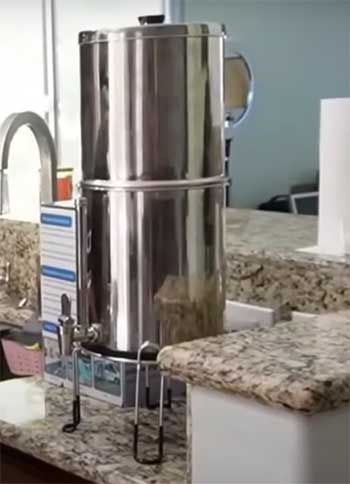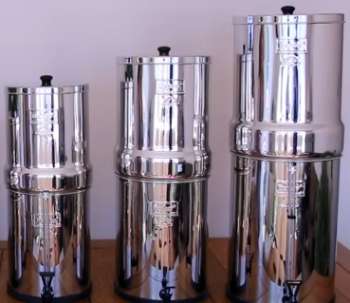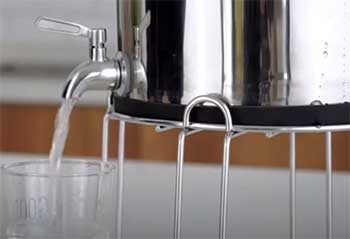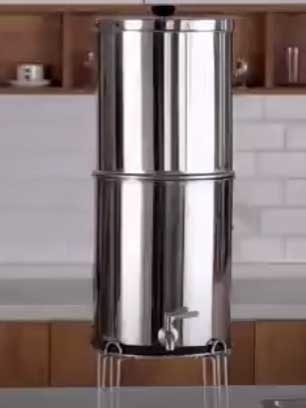I remember when I first decided to upgrade my home water filtration system. It felt like a significant step toward healthier living. I wanted something reliable, efficient, and trustworthy—something that would ensure the water my family and I drink is as pure as possible.
That’s when I started looking at gravity-fed water filters and came across two popular choices: Purewell and Berkey. You might be in a similar situation, wondering which of these two brands better suits your needs. My goal here is to present an honest, easy-to-understand comparison to help you make that decision.
What you’ll see in the following sections is my personal analysis of these two filtration systems. I’ll look closely at the filtration methods, the contaminants they claim to remove, their long-term costs, brand reputation, and overall user experience.
I’ll also include a handy comparison table right now, so you can get a quick overview before we get into the details. By the end, I want you to feel confident about choosing the right filter for your home.
| Feature | Purewell | Berkey |
| Filtration Method | Multi-stage (often includes carbon block) | Black Berkey Elements (carbon-based) |
| Contaminants Removed | Various bacteria, chlorine, heavy metals, sediment | Bacteria, viruses, cysts, heavy metals, chlorine |
| Filter Life | Approx. 3-6 months depending on usage | Black Berkey elements ~6,000 gallons total |
| Build Material | Stainless steel or BPA-free plastic models | Primarily stainless steel |
| Capacity Options | Smaller countertop units to larger gravity units | Multiple sizes (e.g. Travel, Big, Royal) |
| Price Range | Generally more budget-friendly | Mid-range to high depending on model |
| Maintenance Ease | Simple to replace filters, basic cleaning | Requires priming filters, periodic scrubs |
| Brand Reputation | Growing but less historic brand presence | Established brand but faced controversies |
Key Differences With Purewell And Berkey Filters
Now that we have this snapshot, let’s look more closely at what sets these two brands apart and where they excel or come up short. After all, it’s not just about the data—it’s about what actually feels right for you and your family.
- Understanding the Filtration Process

When I first looked at Purewell and Berkey, I started by understanding how each one filters water.
Both use gravity-fed systems.
You pour water into the top chamber, and it drips down through filters into a lower chamber.
There’s no need for electricity or complex plumbing.
Purewell units often rely on multi-stage filtration.
This can include ceramic filters, carbon blocks, and other media layers designed to remove sediments, chlorine, and various contaminants.
Think of it as a layered approach, each level catching something different.
Berkey uses what they call “Black Berkey Elements.” These are specialized carbon-based filters that are known for their ability to handle a broad spectrum of contaminants. They’ve been around for quite a while, and many people trust them due to their long track record.
Their filtration is known for reducing harmful bacteria, viruses, heavy metals, and other toxins. These filters usually last a very long time, which can reduce your need for frequent replacements.
In practice, both filters rely on a simple principle: gravity does the work. You don’t have to set up complicated piping, and you don’t need electricity. For me, that’s a major plus.
Whether you pick Purewell or Berkey, you’re choosing a system that can work almost anywhere—helpful if you’re off-grid, traveling, or simply want an easy, low-maintenance solution. The main difference is just how thoroughly each system scrubs your water.
Berkey’s reputation suggests it targets a wide range of contaminants, while Purewell might be more focused on everyday impurities like chlorine and sediments, though they do claim to remove various heavy metals and bacteria as well.
- Contaminant Removal Capabilities
Everyone’s situation differs. Some of you might be dealing with well water that has a higher bacterial load. Others may rely on municipal tap water with plenty of chlorine and a chemical taste. The key question: which system removes more unwanted stuff?
Purewell filters often claim to remove bacteria, reduce heavy metals, and improve the taste by cutting down chlorine. They usually feature activated carbon stages, and sometimes additional layers to handle sediments and even some organic compounds.
While I’ve found that Purewell units do a decent job at improving flavor and clarity, the depth of their contaminant removal can vary. Also, the lifespan of each filter might be shorter than some other brands, which can affect how consistently the filter removes certain contaminants over time.

Berkey filters are often praised for their robust performance.
According to the manufacturer and various independent tests, the Black Berkey Elements can remove or significantly reduce a wide range of contaminants including bacteria, viruses, protozoa, heavy metals (like lead and mercury), chlorine, pesticides, and even pharmaceutical residues.
Many consumers trust Berkey filters for emergency preparedness because of these claims. There’s a reason these systems have had such a strong following.
However, any claim should be taken with a critical eye. Certification and transparency matter. While Berkey has had its share of controversies (which I’ll discuss later), it still stands as a well-known name in this category.
Purewell, being a relatively newer player, might not have the same wealth of testing data readily available. Still, many everyday users find Purewell’s performance perfectly adequate for normal tap water filtration.
- Filter Life and Maintenance
Maintaining a filter system shouldn’t feel like a chore. After testing both kinds, I realized that proper maintenance directly affects both performance and cost.
Purewell filters tend to last around 3 to 6 months depending on how much water you use and the initial quality of your tap water. Replacements are straightforward—you lift out the old filter, pop in a new one, and you’re set.
The shorter lifespan might mean you spend more over the long term, but it’s also a simple process.
Berkey’s Black Berkey Elements can last for several thousand gallons—some say up to 6,000 gallons or more for a pair of filters. This longevity can mean years before you need replacements, especially if you’re filtering for a small household.
But Berkey filters require priming before their first use (you have to run water through them in a specific way) and periodic scrubbing to maintain flow rate. It’s not difficult, but it adds a step that some users find mildly inconvenient. Still, I see this as a fair trade-off for the extended filter life.
Once you get used to it, cleaning is not that big of a deal.
For me, the decision here is about how often you want to deal with replacements and cleanings. With Purewell, you might replace filters more frequently but with fewer maintenance steps. With Berkey, you buy filters less often, but you have to spend a bit more time caring for them. Depending on your preference, either can be workable.
- Build Quality and Materials

The material quality can impact both durability and aesthetics.
Purewell offers various models, some stainless steel and others BPA-free plastic.
The stainless steel units tend to feel more solid and can blend nicely into a modern kitchen.
Plastic models are often lighter and more portable—great if you like to take your filter with you when camping or for travel. The downside is that plastic might not last as long or look as sleek.
Berkey is known for its shiny stainless steel gravity filters. The classic Berkey look is quite iconic. The construction usually feels robust and long-lasting. It doesn’t scream “cheap” at all.
One of the reasons people invest in Berkey systems is the sense that they are built to endure for years. That sturdiness translates to confidence that your filter won’t buckle under everyday use.
If you’re concerned about durability, Berkey’s stainless steel construction often wins people over. If portability, price, or design variety matters, Purewell’s lineup might be more appealing.
I personally appreciate the look and feel of a stainless steel body in my kitchen, but I also know some folks want a lighter unit they can move around easily.
- Capacity and Sizing Options
How much water do you need filtered at a time? For a single person or a couple, a small countertop unit might be enough. A family of five might need something bigger.
Purewell offers a range of sizes. Smaller countertop options might hold around one or two gallons at a time, which can be enough for daily drinking water. Larger gravity units can offer more capacity, making them suitable for families or small offices.
Berkey also comes in various sizes: Travel Berkey for individuals or couples, Big Berkey for small families, and Royal or Imperial Berkey for larger households. Having multiple sizes means you can pick a system that matches your daily water consumption without constantly refilling.
For me, sizing boils down to convenience. Having a unit that you don’t have to fill multiple times a day is a big plus. Both brands give you options, so it’s really about matching the model to your household’s needs.
- Cost and Value for Money
Cost involves more than just the initial purchase price. Think about filter replacements, maintenance, and how long the system will last. Purewell filters are often more budget-friendly upfront.
If money is tight, a Purewell system can be a great introduction to gravity-fed filtration. But keep in mind that if your filters need replacing every few months, those costs add up over time.

Berkey systems typically cost more initially.
You invest in that shiny stainless steel body and the highly reputed Black Berkey Elements.
However, the long filter life can even out the investment.
If your Black Berkey filters last for a few years, you might find that you spend less over the system’s lifespan compared to frequently replacing cheaper filters.
It’s like buying a pair of high-quality shoes—you pay more at the start, but they last longer, giving you better value over time.
Of course, personal budgets vary. If you just need a short-term solution or aren’t sure you’ll stick with filtration long-term, Purewell’s lower entry cost might make sense.
If you’re in it for the long haul and appreciate not having to frequently swap filters, Berkey might be the better value. It’s a matter of what you find important—upfront savings or long-term cost-effectiveness.
- Brand Trust and Reputation
Brand reputation can influence how comfortable you feel buying a product. Berkey’s name is well-established. For many years, Berkey was often considered a top-tier option, popular among those who value comprehensive filtration. However, Berkey’s reputation has not been without issues.
In recent times, there have been controversies surrounding testing, certifications, and even legal disputes. Some users have raised concerns about transparency. Rumors and regulatory announcements added confusion, leading some to question the brand’s reliability.
Purewell is relatively newer on the scene. While it may not have the long history of Berkey, it also hasn’t been surrounded by the same level of controversy. Some folks like that Purewell appears more straightforward, while others crave the familiarity and long-standing track record that Berkey once represented.
I think it’s essential to weigh how much trust and peace of mind matter to you. If you’re the type who wants a product with a household name and a large user base, Berkey might still hold appeal, though you’ll want to be aware of the recent concerns.
If you’re open to a newer brand and appreciate a fresh approach, Purewell may feel less complicated.
- Ease of Use and Convenience
One reason I like gravity-fed filters is their simplicity. You pour in water, wait, then drink. But ease of use also depends on assembly, cleaning, and replacing filters.
Purewell filters generally offer a plug-and-play approach. You install the filter cartridge, add water, and that’s basically it. Maintenance involves changing the filter every few months. Cleaning the unit itself is typically a matter of wiping it down and rinsing as needed.
Berkey is also straightforward once set up, but the priming process for the Black Berkey Elements can feel a bit extra if you’re new. Scrubbing them occasionally might seem like a chore. Still, we’re talking about a few minutes of effort every couple of months, not an everyday hassle.
If absolute simplicity is your priority, Purewell might edge out here due to fewer steps. If you’re comfortable with a bit of extra effort for a more robust, long-lasting filter, Berkey still holds its own.
- Taste and Overall Drinking Experience

The ultimate test: How does the water taste?
Both systems aim to improve flavor.
Purewell filters tend to remove chlorine flavors, resulting in water that’s crisp and pleasant.
I’ve found Purewell to be effective enough for everyday drinking, making tap water taste much better.
Berkey’s filters produce water that many describe as exceptionally clean and pure.
The multi-contaminant approach might give you a greater sense of reassurance that what you’re drinking is really filtered.
It’s subtle, but knowing your water is carefully treated can psychologically enhance that fresh taste.
In all honesty, both do a good job here. Taste is subjective, and you might not notice a huge difference. But I’ve known folks who swear that Berkey water tastes like it came straight from a mountain spring, while Purewell users are just happy their tap water no longer tastes like a swimming pool.
Pros And Cons of Purewell Water Filter
Pros:
- Generally more affordable upfront
- Straightforward maintenance with easy filter replacements
- Decent contaminant removal, improves taste and clarity
- Offers both stainless steel and plastic options for versatility
- Good for those on a tight budget or wanting a simple solution
Cons:
- Filters may need replacing more frequently, increasing long-term costs
- Contaminant removal may be less extensive than Berkey’s claims
- Shorter brand history and fewer independent test results available
Pros And Cons of Berkey Water Filter
Pros:
- Widely recognized brand with long history
- Robust filtration that targets a wide range of contaminants
- Long filter life reduces frequency of replacements
- Sturdy stainless steel construction built to last
Cons:
- Higher upfront cost may deter budget-conscious buyers
- Priming and cleaning filters can add extra steps
- Recent controversies around testing and certification may cause uncertainty
Personal Recommendation
When I think about which one I’d pick if I had to choose today, I weigh convenience, cost, and peace of mind. If I’m on a budget and I want something simple, Purewell’s straightforward approach might appeal.
The initial cost is lower, and it improves my water’s taste and clarity without fuss. It’s a good starting point.
If I’m looking for something more substantial and I’m willing to pay more upfront, the Berkey system still has its charms. Despite controversies, many users still trust Berkey for thorough filtration. The idea that I won’t have to change filters frequently is a big draw.
Once I’m comfortable with the priming and cleaning routine, I could easily see myself relying on a Berkey system for years.
In the end, it comes down to you and your priorities. If you value a tried-and-true, time-tested filtration approach and don’t mind spending a bit more, Berkey might remain your top choice.
If you prefer a simpler, more budget-friendly system and you’re not as concerned about the widest range of contaminants, Purewell can be an excellent fit.
Frequently Asked Questions (FAQ)
Berkey hasn’t exactly gone “out of business,” but there have been regulatory challenges and distribution issues in certain areas. These conflicts created confusion and led to questions about their availability. Some interpret these difficulties as Berkey facing business troubles, while the company still operates but under constraints.
Typically, Purewell filters last between 3 to 6 months, depending on how much water you filter and the initial quality of your tap water. After that, you’ll need a new filter to maintain performance.
The EPA didn’t enforce a nationwide ban on Berkey filters. However, some local regulations and disputes arose around how Berkey products were tested and certified. This led to restrictions in certain jurisdictions, causing some confusion and rumors about bans.
Purewell may not have all their filters NSF certified. Some of their products might have components tested to certain standards, but they might not hold the full NSF certification on the entire system. It’s best to check the latest details from the manufacturer or product packaging.
Wrapping Up
I know how confusing it can be to pick the “perfect” water filter. You’ve got these two popular names—Purewell and Berkey—and both promise cleaner, better-tasting water.
But as you’ve seen, they come at the issue from slightly different angles. Purewell offers affordability and simplicity, while Berkey provides long-term value and a more extensive filtration range.
Now it’s time for you to decide what you care about most. Is it upfront cost or extensive contaminant removal? Is it ease of maintenance or a brand’s legacy? If you’re like me, you want a product that you can rely on for your family’s health.
Purewell might be the easier entry-level choice, while Berkey appeals to those who want a comprehensive and time-tested solution—despite some recent uncertainties.
Whichever path you choose, remember that any gravity-fed filter is likely to be an upgrade over plain tap water. You’ll be doing something positive for yourself and those you care about, reducing the potential intake of unwanted contaminants.
By understanding the differences between Purewell and Berkey, I hope you feel more confident about making a choice that suits your lifestyle, budget, and water quality needs.

Fluoride is covered by Pure Well? If so, that is great. Just also wondering if pharmaceutical residues found in tap water are also reduced by Pure Well filters.
Your article is nicely informative and clear in the general comparison.